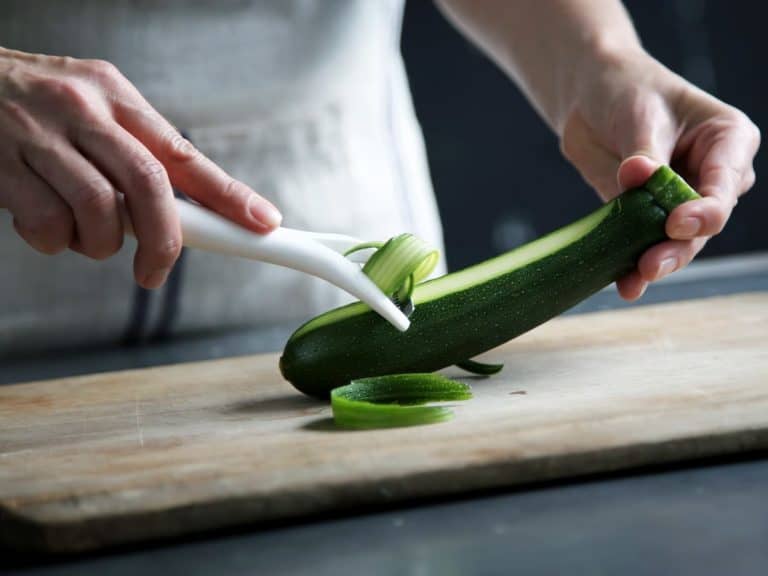Salaries and Career Prospects of Chefs and Other Culinary Professionals
As someone who plans on becoming a part of the culinary industry, you will have to start somewhere. And an indispensable part of the humble beginnings of career persons is receiving starting salaries during the first few weeks or months of employment until they are able to prove they are worthy of getting median salaries.
Below, you will come across the various career prospects for as well as the starting salaries of chefs and other culinary professionals, no matter if holders of a bachelor’s or associate degree or not.
Let’s kick things off by talking about something that many dream of becoming one day…
Types of Chefs And Their Salaries
Too many cooks spoil the broth and too many types of chefs can leave one confused.
Especially if you are planning on attending a culinary school in order to become a chef, it’s of utmost important to determine just what type of chef you want to become so that you can prepare for it better. Different chefs have different duties and responsibilities, which is why they have different salaries, too.
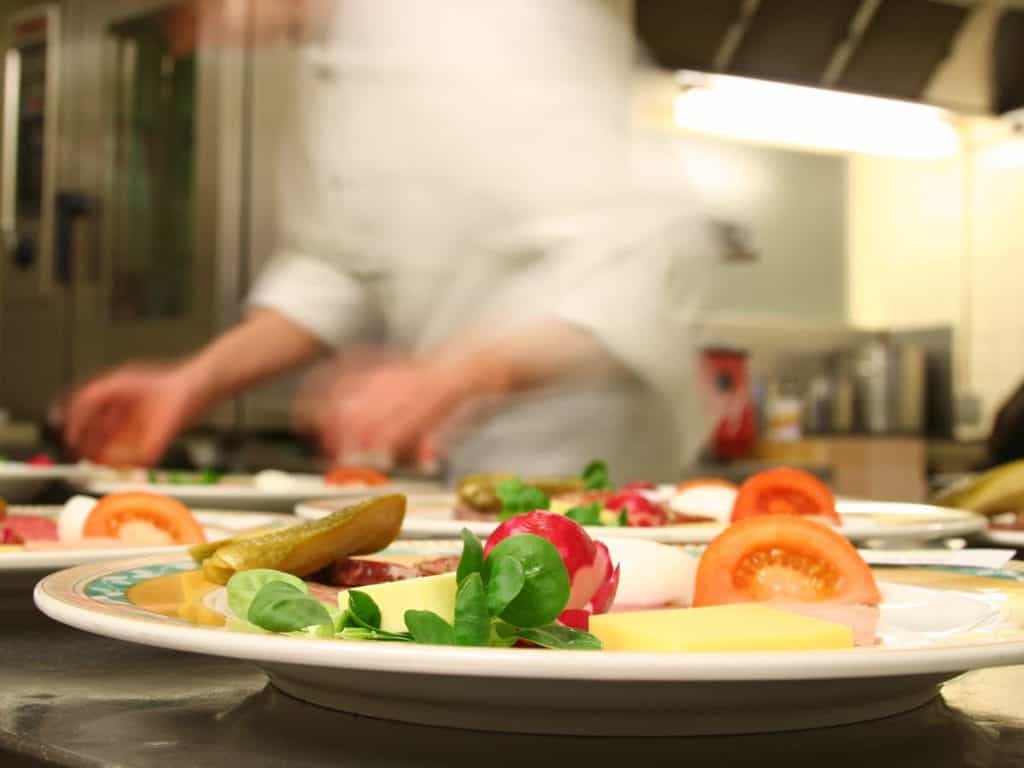
Here are the various types of chefs to choose from:
Head Chef
Also known as executive chefs, you can think of head chefs as the big bosses of the kitchen. Since they are tasked with running the entire culinary team, it’s no wonder that they are the most paid. It can take a culinary arts degree and years and years of kitchen experience for one to become a head chef.
Average annual salary: $74,202
Sous Chef
Simply put, sous chefs are responsible for assisting head chefs in manning the kitchen. And it’s for this reason why they are also sometimes referred to as assistant chefs. Depending on the size of the kitchen, there can be multiple sous chefs. But there will always be just one head chef they will have to lend a hand to.
Average annual salary: $56,246
Station Chef
Working directly below the head chef is the sous chef. And working directly below the sous chef is the station chef, who is also known as the chef de partie. In most instances, station chefs are responsible for all the tasks in one area of the kitchen. Needless to say, they are also tasked with managing the said area’s entire team.
Average annual salary: $47,471
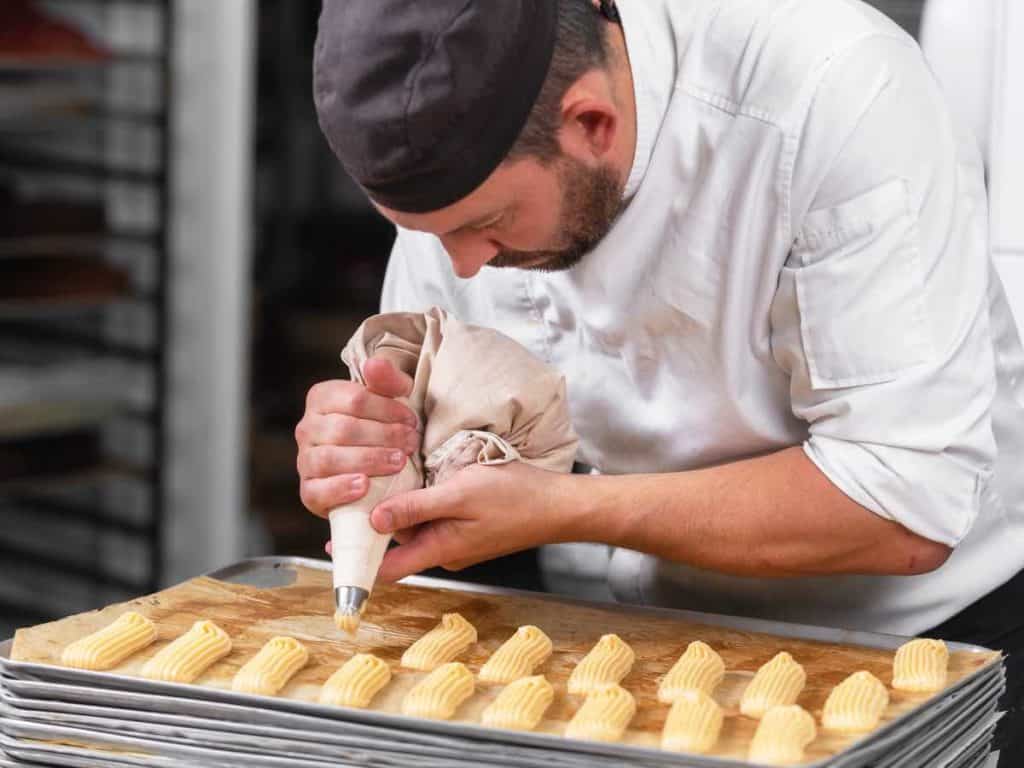
Pastry Chef
Also sometimes called patissiers, pastry chefs are skilled in making all sorts of baked goods, from bread, pastries to desserts. You can consider all pastry chefs as bakers — there are various types of bakers, ranging from master bakers to production bakers. However, you cannot consider all bakers as pastry chefs.
Average annual salary: $42,675
Saucier
When it comes to fine dining, every single element must be perfect. And this is exactly why sauciers are around. Also known as sauce chefs, they are culinary experts who are tasked with preparing flavorful sauces that will accompany dishes, especially protein-based ones. Sauciers are typically under sous chefs.
Average annual salary: $40,256
Pantry Chef
Large restaurants tend to have massive refrigerators. And everything stored in them falls under the care of pantry chefs. Also known as chefs garde manger, some of their primary tasks include ensuring that all refrigerated food products remain fresh and checking that there are enough ingredients available.
Average annual salary: $39,693
Expediter
The task of expediters is to check that the meals are perfectly plated and served correctly, which is why it’s not unlikely for them to be spotted standing near the door. Commonly, only large kitchens have expediters. In small ones, the head chefs are usually the ones that take on the task of expediters.
Average annual salary: $34,279
Fish Chef
Anything and everything that has something to do with preparing fish is the responsibility of fish chefs or poissonniers. Most of the time, fish chefs are found in restaurants with an impressive selection of fish dishes on the menu. It’s quite common for fish chefs to be also responsible for purchasing fresh fish and making accompanying sauces.
Average annual salary: $31,583
Meat Chef
Traditionally, meat chefs or rotisseurs, which means roast chefs, are the ones who prepare roasted and braised meat dishes. It’s also a part of their job to create various appropriate sauces. Nowadays, however, meat chefs also have responsibilities extending beyond their traditional tasks, including frying and grilling meats.
Average annual salary: $31,583
Vegetable chef
Just about any dish that does not involve meat and fish is prepared by entremetiers — or what most everybody refers to as vegetable chefs. They are also tasked with preparing egg dishes and non-meat-based soups. There are various vegetable chef types. Some common examples are legumiers and potagers.
Average annual salary: $31,583
Commis chef
Most individuals who dream of becoming higher-level chefs start as commis chefs. What they do is that they work alongside various kitchen staff members. This allows them to learn the ropes in the kitchen and obtain all the knowledge and skills necessary in order for them to be able to climb up the culinary career ladder.
Average annual salary: $35,100
Roundsman
There are also culinary experts who perform whatever is needed in various stations instead of carrying out a specific task in the kitchen on a day-to-day basis. So, in other words, they fill in for others, which means that they need to be highly versatile and flexible. They are roundsmen, who are also called chefs de tournants, swing cooks or relief cooks.
Average annual salary: $27,935

Chef vs. Cook: Salary Differences
Especially if you are eyeing a certain position or salary range, it’s important to know the differences between chefs and cooks. While it would seem like they are one and the same, certain things set them apart.
Simply put, chefs are individuals trained to understand cooking methods and techniques, which is vital for them to be able to come up with signature recipes and menus. They are also tasked with overseeing professional kitchens and the staff members, too. Cooks, on the other hand, prepare food by following recipes.
Let’s discuss something that sets chefs and cooks apart, which is none other than their salaries.
Because of their educational background and training and the positions they hold in the culinary industry, it doesn’t come as a surprise that chefs make more money per year than cooks.
In the US, the average starting annual salary for chefs is $35,044 — it can be lower or higher, depending on factors like their educational background, work experience, position and location. In 2021, according to the US Bureau of Labor Statistics, the median salary of chefs amounts to $50,160 per year ($24.11 per hour).
A Northeastern University report says that bachelor’s holders make an additional $19,288 per year, on average.
Considering the figure given above, it’s safe to assume that chefs with a bachelor’s in culinary arts degree or a similar or related bachelor’s degree earn more annually.
In a few, we will talk about the salary potential of culinary arts degree holders — so keep reading!
Also affecting just how much professional chefs make is where they work. The following demonstrates the mean annual wage of chefs according to the industry:
- Amusement and recreation: $68,700
- Traveler accommodation: $67,260
- Special food services: $61,970
- Assisted living facilities: $54,720
- Restaurants and other eating places: $52,920
Meanwhile, cooks working in the US receive a median salary of $29,120 per year. That’s equivalent to $14.00 per hour. The lowest paid 25% of cooks in the land make an average median annual salary of $24,210. The best paid 25% ones, on the other hand, make about $33,550 per year.
The job position is one of those with the most impact on the salary of a cook.
Is Culinary School Required to Become a Chef or Cook?
Many who dream of becoming culinary experts fill their college list with culinary schools.
Doing so will allow them to gather all the knowledge and skills necessary for them to be able to take the career path of their liking. Similarly, it will enable them to earn a certificate or degree for higher employability and salary potential.
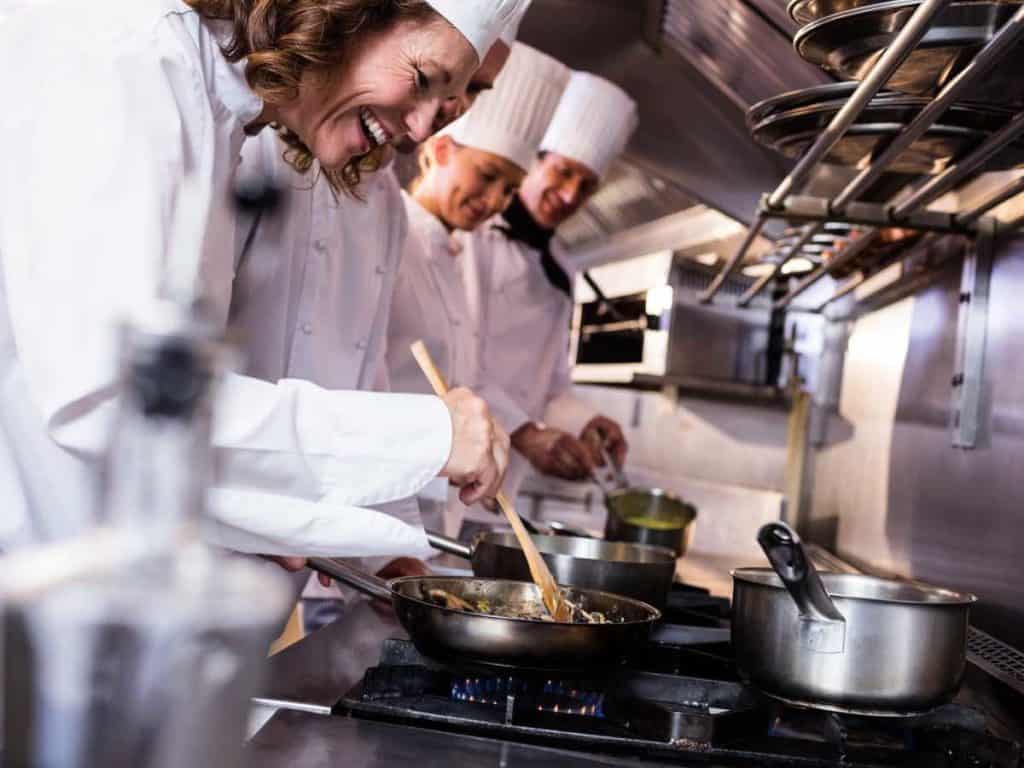
Not too many people know that they can skip cooking schools and still become chefs or cooks.
This does not mean, however, that they can easily snatch some of the top positions in the kitchen without learning in a structured and formal setting beforehand. What they have to do is to become qualified for their desired positions via hard work and experience, which requires many years of being employed in a related industry.
Below, you will come across some chefs or cooks who are popular and admired by many but did not go to any culinary school. See which of these names ring a bell:
- Gordon Ramsay
- Guy Fieri
- Ina Garten
- Jamie Oliver
- Martha Stewart
- Nigella Lawson
- Paula Deen
- Rachel Ray
- Ree Drummond
- Thomas Keller
- Tiffani Thiessen
- Tom Colicchio
Needless to say, it’s very much possible for you to be a chef or cook, even one who appears on TV and writes cookbooks, without taking culinary arts. However, you will need to possess exceptional culinary skills and unparalleled charisma just like the individuals mentioned above.
You can work in a kitchen to master everything you have to master for 5, 10 or 15 years. Or you can attend a culinary school and earn much-needed credentials in just a few months to up to 4 years.
Here are some of the pros of taking a culinary arts course or majoring in it:
More career opportunities
One of the things that employers consider when deciding whether or not to accept candidates is if they can spend the least amount of resources for training on the job.
A certificate or diploma conferred by an accredited cooking school is indicative of the possession of an established skill set obtained from a formal environment. Also, the fact that candidates have finished school serves as proof that they are hardworking individuals and committed to being in the culinary industry.
Got a particular culinary job in mind? Going to culinary school allows you to major in a discipline that will let you have a resume perfect for the career path of your choice.
Some of the available choices at most culinary schools include:
- Baking and pastry arts
- Culinary arts
- Culinary science
- Food business
- Hospitality management
- Wine and beverage management
Better salary potential
It’s not just having more career choices that culinary school graduates can enjoy. Those who attend culinary schools tend to have higher starting salaries, which is perfectly understandable since individuals with associate degrees and bachelor’s degrees make more than those without any college degree.
The higher the position in the kitchen, the higher the annual salary.
Which culinary school you attend can also have an impact on how much money you can make per year — some cooking schools are simply more reputable and admired than the rest.
To give you an example, here are the average starting salaries of graduates of popular culinary schools:
- Culinary Institute of America: $43,900
- Le Cordon Bleu: $36,000
- Kendall College of Culinary Arts: $33,300
- Sullivan University National Center for Hospitality Studies: $29,500
- Institute of Culinary Education: $29,100
- Johnson & Wales University: $28,200
- Culinary Institute LeNotre: $27,600
- Metropolitan Community College: $24,100
Exposure to techniques and cuisines
Learning and training in an actual kitchen rather than at a culinary arts school may limit the kind of knowledge and skills possible for you to gain, thus setting a maximum threshold for your potential.
Working as a cook at a sushi restaurant, for instance, can keep you from learning things other than sushi.
At a culinary school, on the other hand, you can expand your knowledge week by week and month by month. This is especially true since earning a culinary arts degree isn’t bound to a particular menu or style. So, in other words, you can explore and master a wide variety of cuisines.
What’s more, attending a cooking school lets you learn a staggering variety of cooking techniques and skills, all of which can come in handy when it’s time to make a resume and show what you got in a professional kitchen.
Networking opportunities
Chef instructors and like-minded peers — these people can lend a hand when it’s time to look for a job after the completion of one’s culinary arts program.
Some of them may be starting up restaurants or working for employers looking for fresh talents.
Many culinary arts schools also include industry externships in the curriculum, which allows students to gain some experience before they earn their certificates or degrees.
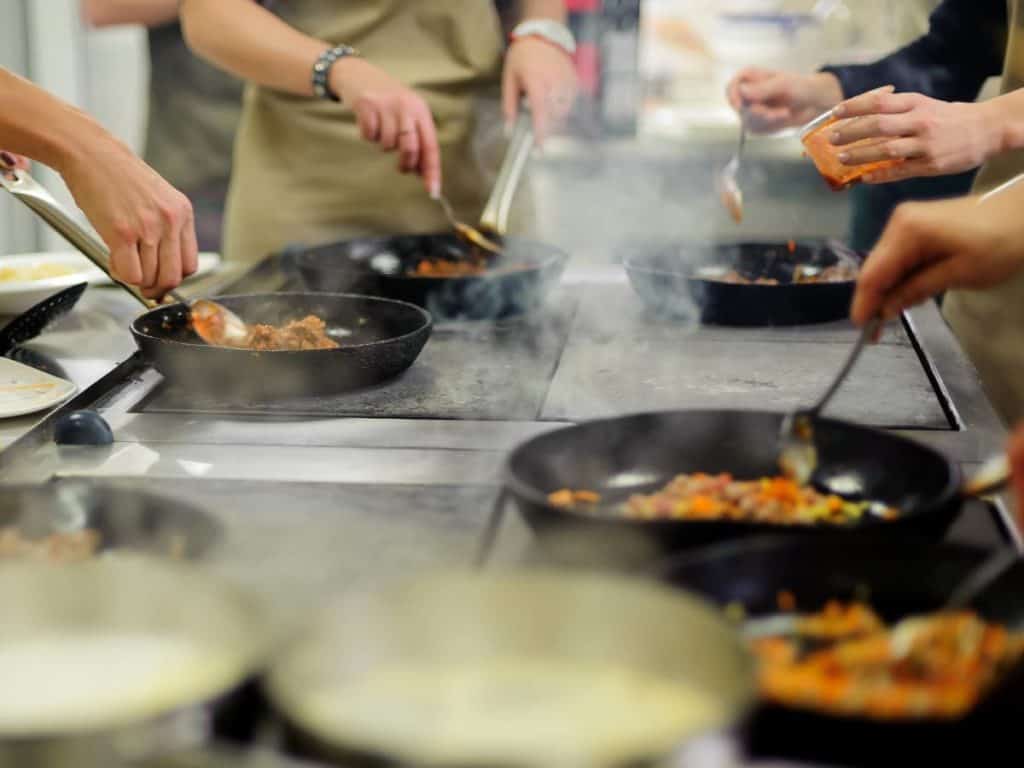
Besides real-world know-how, externships also provide culinary arts school attendees the opportunity to connect with actual chefs and cooks and other culinary professionals, potentially paving the way for lifelong friendships and even valuable employment opportunities.
The projected employment of chefs and cooks is expected to grow 25% from 2020 to 2023, which is much faster than the average outlook for other occupations (8%).
By networking as a culinary school student, you may find it easier to land your dream job — a certain position in the kitchen of a particular restaurant, hotel or casino. Networking, by the way, also lets you acquire tips and advice from successful people and obtain information vital to the industry of which you are about to become a part.
Adherence to good habits and industry standards
There are many qualities that good culinary professionals share in common. Most of them can be instilled and honed at culinary schools, such as good habits in the kitchen.
Timeliness, cleanliness, team playing, leadership, stress management, organizational skills — these and many others culinary students can develop as they work on their diplomas.
Strict health and safety standards in a commercial kitchen are also taught at culinary schools. So, in other words, you will learn to make not only dishes that are delicious but also safe to eat.
Maintaining good habits and upholding standards can help establish a stable and satisfying career.
While these things can also be acquired outside of a cooking school and inside an actual commercial kitchen, nothing can beat learning them via a universal and verified set of rules that are primarily designed to minimize risks and hazards, ranging from fires, burns, falls and food poisonings.
Culinary Arts Related Careers
As a culinary professional, you can slowly work your way up to the highest possible position in a commercial kitchen: the head or executive chef. The same is true if you start out as a cook — with determination, dedication and promise, it’s possible to eventually become the kitchen’s big boss!
Whether you are already at the top or you are on your way there but you feel like you belong elsewhere, fret not. That’s because there are alternative careers that will allow you to pursue pretty much the same passion.
Some of them can be more fulfilling and even pay more per year.
For instance, with some managerial skills and experience, you can become a cafeteria manager, which will allow you to make an average salary of $74,495 per year. Or if you possess killer interpersonal, rapport-building and negotiation skills, you can rake in an average of $62,170 per year as a food sales representative.
While some of the available alternative careers are ready for you to grab, there are those that may require you to undergo some training or take certain courses beforehand for eligibility purposes.
Just Before You Step Foot Into the Culinary Industry
While having some above-average cooking skills is usually more than enough to get you employed in a professional kitchen, nothing beats having the right credential if you want to have your dream culinary job.
Attending a culinary school allows you to get a related certificate or associate or bachelor’s degree.
Various factors can affect your employability, salary potential and even job stability. The combination of formal culinary arts training and real-world experience can help you land your preferred position in a commercial kitchen, including especially a top-tier one that will allow you to utilize your talents, skills and potential to the fullest.
Check also the list of 150 culinary jobs.

